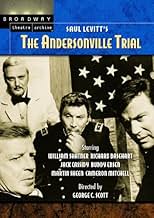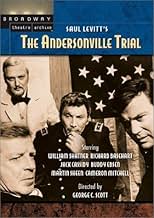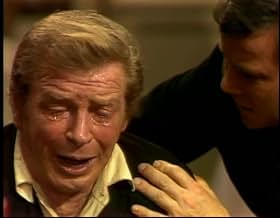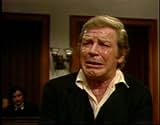Füge eine Handlung in deiner Sprache hinzuA dramatization of the 1865 war-crimes trial of Henry Wirz, commandant of the notorious Confederate POW camp at Andersonville, Georgia.A dramatization of the 1865 war-crimes trial of Henry Wirz, commandant of the notorious Confederate POW camp at Andersonville, Georgia.A dramatization of the 1865 war-crimes trial of Henry Wirz, commandant of the notorious Confederate POW camp at Andersonville, Georgia.
- 3 Primetime Emmys gewonnen
- 4 Gewinne & 2 Nominierungen insgesamt
Dal McKennon
- First Guard
- (as Dallas McKennon)
William Bryant
- The Lieutenant
- (as Bill Bryant)
Empfohlene Bewertungen
A wonderful TV movie about the most notorious of the "concentration camps" of the American Civil War. It has a first-rate cast, with Richard Basehart giving an especially intense performance as the camp commandant. I hope some day it comes out on video or is rebroadcast, perhaps by the History Channel.
Based on a Broadway play, THE ANDERSONVILLE TRIAL was a made for television production directed by George C. Scott with a number of major performances, led by William Schatner as the Union Prosecutor, and Jack Cassidy as the Southern born defense counsel for Confederate Captain Henry Wirtz (Richard Basehart). The court-martial is headed by General Lew Wallace (Cameron Mitchell), who is determined to bring in a speedy, clean-cut verdict as quickly as possible. Among the witnesses is Albert Salmi, a Union soldier who survived the camp, but who has a dirty secret that clever Jack Cassidy pushes into the faces of the court-martial judges.
Historically some 49,000 Union prisoners were sent to Andersonville, and 13,000 died there under hideous conditions. Food was scarce. They had little in the way of proper shelter. The camp's sanitation was non-existent.
Who was to blame? Well, at the time blame was on Captain Wirtz, who was commander of the camp. All decisions for the sake of the men were in his hands, and the number of dead was too large to ignore. However, the Confederacy in 1863-65 was having trouble feeding it's troops and it's people. Wirtz actually tried to get supplies, but couldn't get far on that. Also, Northern prisons for Confederate prisons, such as Elmira in New York State, were equally vile. Finally, attempts by the South to get a trade of captured soldiers with the North ground to a halt due to the combined refusal of General Grant or Secretary of War Stanton to agree to it (they reasoned the released trained southern soldiers would resume war work, and lengthen the course of the war).
Wirtz would be found guilty, and would be hanged in November 1865. He was the only Confedrate hanged for a war crime (unless you count the four Lincoln Assassination defendants). The play tries to show the impossible situation that fell on Wirtz's shoulders, with him trying to balance his duty to the southern cause, his duty to his prisoners, and his fears of those prisoners. Basehart's agonizing testimony on the stand, where he keeps thinking of the prisoners tunneling and tunneling out of the camp, is still a memory to me yet, thirty five years after I saw it the first time.
But there is more than that in the play. The scene where Mitchell is trying to get the prosecution to concentrate only on the facts, and not give rise to a theory of unchecked universal evils ("A world of Andersonvilles", as Shatner puts it)is wonderful. Mitchell is trying to remind Shatner that all he has to do is prove a case against this defendant. Finally, in disgust, Mitchell asks a hypothetical question to test the loyalty of Shatner to the U.S.: What if the U.S. had supported slavery in 1860 and the South supported abolition? Shatner shatters Mitchell by insisting a greater loyalty would dictate supporting the Confederacy.
Jack Cassidy has some terrific moments attacking the prosecution, which he rightly considers a show trial and an act of hypocrisy. He even gets under Shatner's skin at one point by showing how Shatner - if he gets a conviction - will have something to build a political career on.
All in all it was a terrific moment of televised drama. It has been shown occasionally and it should be shown more.
Oh, by the way. I mentioned the Northern Prison Camp at Elmira, NY. It's commander was Benjamin Tracy. In the post war eras (he died in 1917), Mr. Tracy became a successful corporate lawyer, leading New York State Republican, and Secretary of the Navy under President Benjamin Harrison (1889 - 1893). He is considered by some the father of the modern U.S. Navy. Wirtz, his opposite number, was hanged. Sometime in the 1950s or so, his grave received a new tombstone from some unknown supporter. It gives his name, dates of birth and death, and puts under it, "C.S.A. Martyr". I leave it for the reader to decide what was justice or what wasn't.
Historically some 49,000 Union prisoners were sent to Andersonville, and 13,000 died there under hideous conditions. Food was scarce. They had little in the way of proper shelter. The camp's sanitation was non-existent.
Who was to blame? Well, at the time blame was on Captain Wirtz, who was commander of the camp. All decisions for the sake of the men were in his hands, and the number of dead was too large to ignore. However, the Confederacy in 1863-65 was having trouble feeding it's troops and it's people. Wirtz actually tried to get supplies, but couldn't get far on that. Also, Northern prisons for Confederate prisons, such as Elmira in New York State, were equally vile. Finally, attempts by the South to get a trade of captured soldiers with the North ground to a halt due to the combined refusal of General Grant or Secretary of War Stanton to agree to it (they reasoned the released trained southern soldiers would resume war work, and lengthen the course of the war).
Wirtz would be found guilty, and would be hanged in November 1865. He was the only Confedrate hanged for a war crime (unless you count the four Lincoln Assassination defendants). The play tries to show the impossible situation that fell on Wirtz's shoulders, with him trying to balance his duty to the southern cause, his duty to his prisoners, and his fears of those prisoners. Basehart's agonizing testimony on the stand, where he keeps thinking of the prisoners tunneling and tunneling out of the camp, is still a memory to me yet, thirty five years after I saw it the first time.
But there is more than that in the play. The scene where Mitchell is trying to get the prosecution to concentrate only on the facts, and not give rise to a theory of unchecked universal evils ("A world of Andersonvilles", as Shatner puts it)is wonderful. Mitchell is trying to remind Shatner that all he has to do is prove a case against this defendant. Finally, in disgust, Mitchell asks a hypothetical question to test the loyalty of Shatner to the U.S.: What if the U.S. had supported slavery in 1860 and the South supported abolition? Shatner shatters Mitchell by insisting a greater loyalty would dictate supporting the Confederacy.
Jack Cassidy has some terrific moments attacking the prosecution, which he rightly considers a show trial and an act of hypocrisy. He even gets under Shatner's skin at one point by showing how Shatner - if he gets a conviction - will have something to build a political career on.
All in all it was a terrific moment of televised drama. It has been shown occasionally and it should be shown more.
Oh, by the way. I mentioned the Northern Prison Camp at Elmira, NY. It's commander was Benjamin Tracy. In the post war eras (he died in 1917), Mr. Tracy became a successful corporate lawyer, leading New York State Republican, and Secretary of the Navy under President Benjamin Harrison (1889 - 1893). He is considered by some the father of the modern U.S. Navy. Wirtz, his opposite number, was hanged. Sometime in the 1950s or so, his grave received a new tombstone from some unknown supporter. It gives his name, dates of birth and death, and puts under it, "C.S.A. Martyr". I leave it for the reader to decide what was justice or what wasn't.
This greater than two-hour drama recreates the trial of Henry Wirz, commandant of the Confederate POW camp at Andersonville, Georgia. It has an amazing cast of prominent stars of the time, some of whom are quite recognizable, such as Alan Hale as a member of the jury who doesn't even have any lines, and relatively unknown at the time, Charlie Sheen, who only has one line as a soldier.
William Shatner has the largest role as prosecutor and, contrary to his general reputation, does not over-emote but instead pretty much nails the role. He struggles with duty versus conscience, as the crux of his moral argument is that Wirz should have disobeyed direct orders and done more to care for the prisoners in his charge, but then no military tribunal of the time would agree that it is ever acceptable to disobey orders and it would be career suicide to directly argue such a thing. Wirz is played by Richard Basehart, who I've always found to be an underrated actor. Jack Cassidy is the attorney for the defense, Otis Baker, who is a Confederate sympathizer and wishes to point out the hypocrisy of the situation - Confederate prisoners under the care of the Union died in terrible circumstances as well - but he gets shut down by the judge in the situation, played by Cameron Mitchell, who is bombastic in temperament but fair.
The entire play is set inside the courtroom, lasts two and a half hours, and besides being a showcase of very good acting and instructive on Civil War history, it indicates how much longer of an attention span audiences must have had 55 years ago. Public TV would never attempt something of this length in this format today.
George C. Scott, the director, got a very authentic performance out of William Shatner, who could ordinarily be quite stiff. In retrospect, perhaps Scott should have directed a few episodes of Star Trek.
William Shatner has the largest role as prosecutor and, contrary to his general reputation, does not over-emote but instead pretty much nails the role. He struggles with duty versus conscience, as the crux of his moral argument is that Wirz should have disobeyed direct orders and done more to care for the prisoners in his charge, but then no military tribunal of the time would agree that it is ever acceptable to disobey orders and it would be career suicide to directly argue such a thing. Wirz is played by Richard Basehart, who I've always found to be an underrated actor. Jack Cassidy is the attorney for the defense, Otis Baker, who is a Confederate sympathizer and wishes to point out the hypocrisy of the situation - Confederate prisoners under the care of the Union died in terrible circumstances as well - but he gets shut down by the judge in the situation, played by Cameron Mitchell, who is bombastic in temperament but fair.
The entire play is set inside the courtroom, lasts two and a half hours, and besides being a showcase of very good acting and instructive on Civil War history, it indicates how much longer of an attention span audiences must have had 55 years ago. Public TV would never attempt something of this length in this format today.
George C. Scott, the director, got a very authentic performance out of William Shatner, who could ordinarily be quite stiff. In retrospect, perhaps Scott should have directed a few episodes of Star Trek.
One of the many pleasures of this compelling court martial drama, adapted from Saul Levitt's 1959 Broadway play, is seeing actors we associate from with lightweight TV shows doing something meatier.
Lt. Col. N.P Chipman (William Shatner) is the Army prosecutor, Otis Baker (Jack Cassidy) the defense attorney and Gen. Lew Wallace (Cameron Mitchell) the judge in the trial of Henry Wirz (Richard Basehart), the Confederate officer who ran a prisoner of war camp in Andersonville which saw 14,000 Union prisoners die from cruel neglect. Witnesses include Lt. Col. Chandler (Harry Townes), who was assigned to inspect the Andersonville prison; Dr. John C. Bates (Buddy Ebsen), the physician at the camp horrified by his experience; Ambrose Spencer (John Anderson), a plantation owner who can testify that food offered to the camp by nearby residents was refused; James Davidson (Michael Burns, whose liquid blue eyes are an asset to his performance), a haunted 19-year-old prisoner who claims a fellow was torn apart by dogs; Jasper Culver (Lou Frizell) another prisoner who has a story about a man named Chickamauga; Sgt. James Gray (Albert Salmi) who testifies that Wirtz killed a man with his own hands; and Dr. Ford (Whit Bissell), the one witness for the defense. Martin Sheen has a bit as a Union officer; Alan Hale Jr. (the Skipper on "Gilligan's Island") plays one of the court-martial board members, though he has no lines.
My favorite among the supporting cast is Buddy Ebsen, who as Jeb Clampett in "The Beverly Hillbillies" always gave the part far more than it seemed to deserve; here he gives his small role tremendous force with a low-key performance. I also enjoyed John Anderson, who I know from "Twilight Zone" episodes and his role as a used car salesman in "Psycho"; his performance here is typical but welcome.
Jack Cassidy has the same oily charm that serves him so well as a "Columbo" villain; but his character also has a strong sense of justice and credibly charges hypocrisy in his opponent. William Shatner, forever to be associated with "Star Trek," is not the perfect choice for a righteous crusader undergoing his own moral struggle: genuine sincerity always eludes him. But he still gives a richly textured performance and finally is successful in his role. The richest performance by far is from Richard Basehart as the German-accented Confederate officer who chose to follow orders from his military superiors while vetoing his own conscience. The parallels between him and Nazi war criminals is made clear; and Basehart brings out every subtlety to the man in a big, but not overdone or showy, manner.
George C. Scott, who had Shatner's role in the Broadway production, directs admirably well. The play is based on the transcript of the actual trial, with significant changes made for dramatic purposes; for one, Wirz did not testify on his own behalf, as he does here. This is highly recommended to anyone looking for a weighty drama, or a fascinating glimpse at American history.
Lt. Col. N.P Chipman (William Shatner) is the Army prosecutor, Otis Baker (Jack Cassidy) the defense attorney and Gen. Lew Wallace (Cameron Mitchell) the judge in the trial of Henry Wirz (Richard Basehart), the Confederate officer who ran a prisoner of war camp in Andersonville which saw 14,000 Union prisoners die from cruel neglect. Witnesses include Lt. Col. Chandler (Harry Townes), who was assigned to inspect the Andersonville prison; Dr. John C. Bates (Buddy Ebsen), the physician at the camp horrified by his experience; Ambrose Spencer (John Anderson), a plantation owner who can testify that food offered to the camp by nearby residents was refused; James Davidson (Michael Burns, whose liquid blue eyes are an asset to his performance), a haunted 19-year-old prisoner who claims a fellow was torn apart by dogs; Jasper Culver (Lou Frizell) another prisoner who has a story about a man named Chickamauga; Sgt. James Gray (Albert Salmi) who testifies that Wirtz killed a man with his own hands; and Dr. Ford (Whit Bissell), the one witness for the defense. Martin Sheen has a bit as a Union officer; Alan Hale Jr. (the Skipper on "Gilligan's Island") plays one of the court-martial board members, though he has no lines.
My favorite among the supporting cast is Buddy Ebsen, who as Jeb Clampett in "The Beverly Hillbillies" always gave the part far more than it seemed to deserve; here he gives his small role tremendous force with a low-key performance. I also enjoyed John Anderson, who I know from "Twilight Zone" episodes and his role as a used car salesman in "Psycho"; his performance here is typical but welcome.
Jack Cassidy has the same oily charm that serves him so well as a "Columbo" villain; but his character also has a strong sense of justice and credibly charges hypocrisy in his opponent. William Shatner, forever to be associated with "Star Trek," is not the perfect choice for a righteous crusader undergoing his own moral struggle: genuine sincerity always eludes him. But he still gives a richly textured performance and finally is successful in his role. The richest performance by far is from Richard Basehart as the German-accented Confederate officer who chose to follow orders from his military superiors while vetoing his own conscience. The parallels between him and Nazi war criminals is made clear; and Basehart brings out every subtlety to the man in a big, but not overdone or showy, manner.
George C. Scott, who had Shatner's role in the Broadway production, directs admirably well. The play is based on the transcript of the actual trial, with significant changes made for dramatic purposes; for one, Wirz did not testify on his own behalf, as he does here. This is highly recommended to anyone looking for a weighty drama, or a fascinating glimpse at American history.
I have not seen this this very fine courtroom drama in almost thirty years, but it remains an unforgettable experience. Basehart, Shatner, Cassidy, Salmi, and Mitchell all give excellent performances. It is also a highly intelligent film, dealing with complex issues of military morality. indeed, it is puzzling that this fine film has never been rerun..then again, most of the great Television dramas are never rerun. Perhaps a new cable network could be created..call it "QTV' for "quality Television', devoted to shows like The Defenders, Naked City, Slatterys People,The Westerner,My World ( And Welcome to It), Nichols and to the great dramas of the golden age, such as this. Of course, thats yet another impossible dream
Wusstest du schon
- WissenswertesAll of the witnesses as portrayed in the film are the actual witnesses who testified at Wirz's trial, and their dialogue in many cases is taken almost verbatim from the trial transcript. The major change from history is that Wirz did not testify and the whole "moral issue", around which this film revolves, was never raised at the trial.
- PatzerEarly on, a captain played by Martin Sheen comes into the court to tell Gen. Wallace that the defendant tried to hurt himself. The crossed sabers insignia of the cavalry on Sheen's cap is upside down.
- VerbindungenFeatured in The 23rd Annual Primetime Emmy Awards (1971)
Top-Auswahl
Melde dich zum Bewerten an und greife auf die Watchlist für personalisierte Empfehlungen zu.
Details
Zu dieser Seite beitragen
Bearbeitung vorschlagen oder fehlenden Inhalt hinzufügen

























